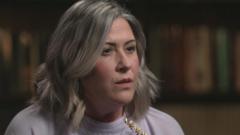In an emotional interview, Caroline Darian details the harrowing discovery of her father's drug-facilitated sexual assaults on her mother and the deep impact it has had on her life. Darian is now advocating for victims and raising awareness about the issue of chemical submission, aiming to help others who might be suffering in silence.
A Daughter's Battle: Caroline Darian's Fight Against Chemical Submission

A Daughter's Battle: Caroline Darian's Fight Against Chemical Submission
Caroline Darian opens up about the traumatic revelations of her father's crimes and her mission to raise awareness about chemical submission and sexual abuse.
On a fateful November evening in 2020, Caroline Darian received a phone call that shattered her perception of family and safety. Her mother, Gisèle Pelicot, revealed a horrifying truth: for nearly a decade, her husband Dominique had been drugging her to facilitate the rape and abuse by multiple men. "That moment transformed everything," said Darian, now 46, during an exclusive interview with BBC Radio 4's Emma Barnett.
Dominique Pelicot, who was sentenced to 20 years in prison after being found guilty in a landmark trial, is described by his daughter as a "dangerous man." This dark chapter in the Pelicot family's history began when Dominique was caught upskirting in a supermarket, leading police to discover thousands of disturbing videos and photographs on his devices—with Gisèle involuntarily featured as the victim.
Beyond merely highlighting the horror of rape and gender-based violence, the case drew attention to the often-overlooked phenomenon of chemical submission, where victims are unknowingly drugged. Darian laments the lack of reporting on this issue, as many victims have no memory of their assault and may be unaware they were drugged.
The aftermath found Darian grappling with the devastation of her father’s betrayal while supporting her mother’s courageous decision to share her story publicly. Throughout the ordeal, Darian also found herself confronting her own suspected abuse, despite the absence of direct evidence. "I know that he drugged me; there were similar telltale signs," she stated, reflecting the painful reality faced by countless survivors who find their testimonies dismissed without corroborating evidence.
In the wake of these revelations, Darian wrote a book titled, "I'll Never Call Him Dad Again," which explores family trauma and the alarming reality of drug-assisted sexual violence. As a survivor herself, she emphasizes the profound need to raise awareness and advocate for those affected by chemical submission.
The Pelicot family is now in a phase of recovery, with Darian committed to educating others about the pervasive dangers of chemical submission and sexual abuse. With the support of loved ones, including her husband and her young son, she aims to forge a path of healing and empowerment, determined to help others who have experienced similar traumas.
With her father's eligibility for parole still years away, Darian remains resolute in her belief that he should remain imprisoned. As she continues her advocacy work, she seeks to ensure that the voices of invisible victims are heard, quietly striving to turn her personal earthquake into a foundation for change in society regarding sexual violence.























